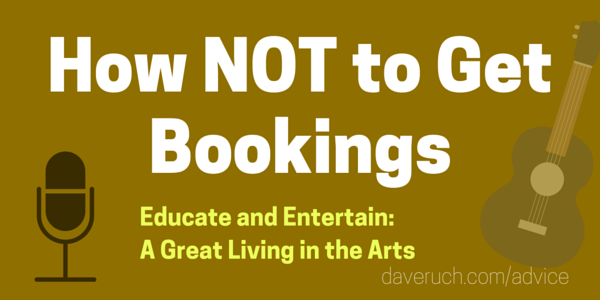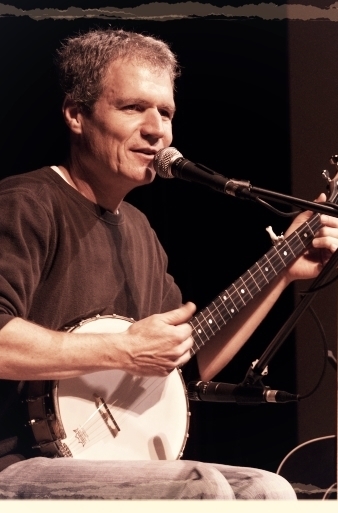There’s been lots of advice offered here on the blog over the years on how to get gigs.
Today, I’m presenting a comprehensive guide to completely blowing any gig opportunity that happens to come our way in this COVID era.
 Musicians, storytellers, puppeteers, and performing artists – if we just follow these simple steps, we’ll be sure to keep our calendars nice and clean.
Musicians, storytellers, puppeteers, and performing artists – if we just follow these simple steps, we’ll be sure to keep our calendars nice and clean.
(Not) Getting the Gig
#1. Don’t check email
Yes, we have an email address listed on our website and promo materials, but everyone should understand that we don’t really use it.
#2. Don’t respond to email once we’ve seen it
We’re busy – why didn’t they just call us, or email a second and third time? Surely they have nothing better to do!
#3. Don’t check our spam folders
Because our email service provider and anti-spam software are 100% accurate in determining what we should – and should not – see.
 (Seriously, I can’t tell you how many gig requests I’ve found in my spam, junk, and “promotions” folders over the years. I now check them daily.)
(Seriously, I can’t tell you how many gig requests I’ve found in my spam, junk, and “promotions” folders over the years. I now check them daily.)
#4. Don’t return calls
They can wait.
#5. Give lots of real-life reasons why we couldn’t/didn’t get back to them
They really need to understand how hard our life is right now.
#6. Don’t update our website
We just don’t have time. They’ll be able to tell how committed and professional we are by that great promo picture we have there from twelve years ago (where, by the way, our hair looks awesome, doesn’t it?).
#7. Don’t send contracts back
Just go ahead and leave them in that messy pile on our desk.
#8. Don’t make it easy for the venue to promote the show
Don’t provide a sample press release, photos, posters, etc – they should have to put in lots of hard work to promote us.
Gig Day
 #9. Whether virtual or in person, DON’T show up on time
#9. Whether virtual or in person, DON’T show up on time
It’s fine. Musicians and artists have a sterling reputation for always being organized and punctual, so our contact person won’t be the least bit worried when we’re running late.
#10. Late for the gig? Blame it on some external factor
The booker surely doesn’t realize we could have just left home earlier, or gotten online earlier, allowing enough time for anything unexpected.
#11. Treat each venue like a performing arts center
They live to cater to acts like ours, and really have nothing else they’re concerned with beyond making sure the experience is optimal for us.
#12. Keep the focus on US
Don’t worry one bit about the buyer’s needs, or making it easy for them to have hired us; they don’t like things to be easy.
 Afterwards
Afterwards
#13. Don’t let them know how much we appreciate the booking
No warm smile on our way out the “door,” and please, no thank you note.
(If we leave them really happy, they WILL want us back. Still, some heartfelt thanks can go a long way towards keeping us top of mind for the next time.)
No More Good Paying Bookings!
There. It’s really that simple. Thirteen steps to an open calendar.
How many of these “best practices” are you currently employing? Got a new one to add to the list? The “Comments” section is just below.
About The Blog
 Since leaving a white-collar marketing job in 1992, Dave Ruch has been educating and entertaining full-time in schools, historical societies and museums, folk music and concert venues, libraries, and online via distance learning programs.
Since leaving a white-collar marketing job in 1992, Dave Ruch has been educating and entertaining full-time in schools, historical societies and museums, folk music and concert venues, libraries, and online via distance learning programs.
Along the way, he’s learned a great deal about supporting a family of four as a musician.
The Educate and Entertain blog provides articles, tips, encouragements, and how-to’s for regional performers (in any region) interested in making a great full-time living in the arts.


Dave, do you have any suggestions on how to handle when a venue says their booked out (after playing several gigs there) or holding off on booking? I’ve run into this with a couple of venues. I’ve been playing in my mind if we did something to upset them (like in the list above) but nothing stands out, and I know we have been performing well. I’m not sure if its budget constraints, bad timing on my part following up (which in and of itself is fluid and varies for each venue), something specific to our performance, or something else entirely.
Would you suggest asking them if there are any problems, give it some time and reach out at a later date, chalk it up to a lost venue, or something else?
That’s a tough one Robin, as it could mean any of the things you’ve listed (and probably several more). This is why it’s always good to keep expanding the number of venues that you are reaching out to, and the geography as well.
Thank you for making this entertaining and informative, Dave! Just like your shows!
We started performing a few years ago at assisted living facilities, nursing homes and senior centers. Unfortunately we had a couple of places not pay us in the agreed time frame. We sent them polite inquiries as to the status. They either said they had to resubmit our invoice or that they would get back to us. We followed up with phone calls after not hearing back for several weeks. We even asked if we should contact Corporate directly, which we did and did not receive a call back either. Finally we went on FB and messaged the company. After a reply and a couple of weeks later we finally received our payment. Needless to say we won’t be performing for them again. Having to ‘hunt down’ our payment has happened twice to us by two different facilities. We had a great relationship with both facilities and the Activities Directors and there wasn’t any problem when they paid us cash in the past. This problem started when we started accepting their company checks. Is this normal? We’re still waiting on the other payment because apparently we have 2 days left before it’s 90 days (they said they pay 60-90 days).
Hi Aurora – I’ve definitely heard similar stories from others who play assisted living and nursing home gigs, often due to recent corporate takeovers of former “mom and pop” facilities. I don’t do these kinds of gigs myself, but you might want to check in to the Comments section on the article on Performing for Seniors (click here).
Thanks Dave, I read the article before posting here. It’s very unfortunate there are similar stories but also a bit of a relief to know it’s not just us. From now on we will be asking upfront what their time frame is for payment BEFORE we accept a gig. We’d rather play for places that pay COD or within 30 days. Above all we prefer working with those who value what we do and show us the same courtesy we show them. We love performing for the residents but we also expect to be paid in a timely fashion.
Thanks for your advice I played a nursing home for the first time I’m a Fiddler it was fun and storytelling,
Good job, It is always easier for me to understand what not to do than it is to know what to do. basic business courtesies are the name of the game. Thanks for the reminder.
How do you deal with booking in a place that is known to overbook and cancel gigs on us? Do you always work with a written simple form contract when booking these gigs of just refuse to play there?
Are there many places that do not want to sign a written agreement?
Hi Jerry – What kinds of places are you playing?
Mostly restaurants as a solo or duo. The places we play are nice places with a bar but some have several manager that have the authority to book acts so overbooking happens in which two or possibly more wind up being booked on the same night. We have been cancelled a few times with a particular restaurant in our area and we have heard that several traveling acts have arrived on location only to find the night cancelled for them.
What do you suggest in dealing with places with that reputation? I personally won’t play there without a contract because they have shown their stripe’s.
That makes sense to me Jerry.
A director told me about someone she won’t use again. In the middle of his performance he yelled at her making a sign of needing something to drink. Then later complained of what she was serving her residents for snacks. I now play for them monthly.
Good for you Catherine! Thanks for sharing
Interesting , funny, informative.
Thanks Martin. Glad to have you as a reader.
Dear Dave,
Which do you prefer for the thank you note and why? Snail mail or e-mail? THabnks
Hi Rochelle – I prefer snail mail. It takes a little more effort, which shows that you truly care, and it also sets you apart from the pack (people tell me they mostly don’t get “thank yous” from performers, and when they do, it’s usually by email).
Thank so much for this, Dave! Now I’m all set to send thank you notes this year. I now know what to do!
Yay!
Dave, when sending a thank you, do you snail mail it and then follow up with an email for a future booking? I try to nail something down at the end of the gig if possible, but that’s not always possible, so I find myself following up via email (after thanking them for their hospitality)
That sounds like a great strategy to me.
I agree with the most of what you all said.. I am not sure about how you think about the points #11 and #12. So I want to leave some thoughts and experiences from the last 30 years working as a Pro.
I see myself as an artist first and I do around 60-70 % concerts (people buy tickets to see me) and 30-40% for private occassions. People engage me, because they want, what I do and not because I do what they want. It was a long way to there and I like you to read the following with this in mind. I have been spending a lot of time with my instrument, I practiced tenthousands of hours and played about 2.500 gigs to get to where I am now.
I am a professional on all hands – from the first call to playing a show.
So what I expect is the same in return: a parking lot, a tidy stage as big as agreed, a tidy backstage or minimum a seperate room to leave the cases and personal stuff and to change my dress before and after the show, a backline in a good condition, a middle-class meal (Pizza, Döner, Bratwurst, Hamburger and other junkfood are NO MEAL) – playing 100-120 shows a year I don’t want to get nutritional garbage to eat.
I am not a provider for anybody who pays me. There are some reasons why peope book me: my special kind of music, my skills and my special kind to create, to play and to moderate a show – that’s my service. But appreciation for me is no one way road and with 52 I have enough self-esteem to name these points. It took me years to think and to live that way, to quit venues, managers or bookers with no apreciation for my work not providing a work-environment for me to play a good show, making bad routings and contracts.
For me, this has nothing to do with proud but with respect for each other and working together in a partnership and not in a one-way relationship of dependency.
Hi Peter – I’m so glad to have your perspective here, and I agree with you 100% about the two-way relationship. Mutual respect is key, so if points #11 and 12 made it sound otherwise, that’s my fault. For me, I like to be as “user friendly” as possible, and people who book me have said repeatedly how much they appreciate that. There’s a big distinction though between being accommodating and getting treated poorly or taken advantage of, which has fortunately never happened to me but certainly could. So again, your points are well taken.
Great perspective on things Peter. Thanks for sharing (and thanks also for the useful articles Dave). I agree with you, we should value what we have to offer and it should be an exchange. Sometimes however it seems difficult to do and it’s hard when some musicians are ready to play for free. As you said, I guess it’s a question of self esteem.
I’ve been making a living as a musician for 11 years now. I come from France and over there, when touring, it’s usually more common to get food and a room. Not every venue offers it, but from my experience, it seems more frequent. They have subsidies that support the arts, so it might be the reason why. The context is a bit different….
Do you have a website, Peter, I would love to check out your music ? All the best!
Hi Eric,
I work in Germany. There is a long tradition of something we call “Kleinkunst.” This means artists who work under the media radar – no television, no radio. But a network of many hundreds of organizers, small cultural initiatives and cultural associations, which are also often run on a voluntary basis and receive some support from the municipalities or from the countryside (such as club status, low-cost or free spaces for charitable purposes and promotion of culture). These are people who cultivate culture out of idealism – not rich idiots who throw out a few bread crumbs from “charity” and then let themselves and others celebrate for it. They are ordinary, culturally educated and interested people who are interested in art far from social status and prestige, who have a heart for innovative and passionate art. Nobody gets rich or earns a lot of money – here on both sides idealists work, who do these things out of love for the cause. Because they consider art and culture as important and because they find that well-made art is uplifting and good for the heart and soul.
If you want to take a look at my work, please visit http://www.mannaufderbank.de (which means “man on the bench”
#18. Show up wearing grungies, take excessive time unloading your crap in the front of building where other guests are also waiting to come in (maybe in wheelchairs or walkers), and use foul language while unloading.
#19. (for church jobs) while setting up, loudly laugh and otherwise make fun of the faith traditions of the pastor that hired you (I actually had someone do this….laughing about XYZ of a church relic, wondering out loud if the pastor was a sex abuser, etc…).
#20. While in the bathroom, talk across the stalls to your coworkers about how ridiculous the mother of the bride looked…then open your stall and find her waiting there with a not pleased look on her face.
Dave is spot on as usual. Thank god I’m not guilty of making these mistakes. Making these blunders will cost you potential gigs, referrals, and repeat customers. Being late for gigs is a pet peeve of mine. I know a face painter who does this all the time. One day last year, she had two gigs booked for the same day. She was late for both! I’ll never recommend her to anyone. Also, going in with a “rock star” attitude with high demands will do nothing more than alienate clients. A simple “thank you” goes a long way. Remember-we need them far more than they need us!
Well said Bill! Thanks for jumping in here. A fellow musician said something like this to me recently: “we’re not there to get OUR problems solved – we’re there to solve THEIR problems.”
Sounds like maybe one or more of these scenarios has happened to you at a wedding gig?
#14 Don’t bring any of our followers to the gig. After all that’s the job of the venue.
#15 Publicly blame the house sound engineer even when it’s not their fault that our sound was crap.
#16 Leave immediately after gig. Don’t hang around to chat to potential new fans. The venue will understand what we’re very important and busy people. In any case it’s their job to recruit new fans.
#17 Don’t treat the backline with respect especially if it’s the house backline..
Go Frank! Awesome contributions…
Good informative article, Dave!
I’ve done many kinds of venues (except the big stage pro ones) especially for children’s venues and there are two opposites brought up here, One is the school office person, or parent volunteer, or director who DOES need you to follow all these tips because hiring you is not their main or most important job and they don’t always know what you need or how to treat you because they just book it and pay you and don’t really know what else they could do, The opposite would be the professional concert person who knows what you need and does all the extras. And then there is everyone in between. So better safe than sorry (and one thing i’ve learned is to prepare for that “non-knowledgeable, non-musician who might not have thought about things like your food, an extension cord, parking with your heavy stuff, space, etc. Esp in schools, where they are so busy AND so overworked. So I bring an extension cord in the car –no more chasing the janitor around the building looking for one last minute–, food and water, sometimes a blanket for the ground and a stool, etc etc etc.
I am there to help them and bring them the best experience for their audience.
Well said Amy. Better safe than sorry is my MO as well.